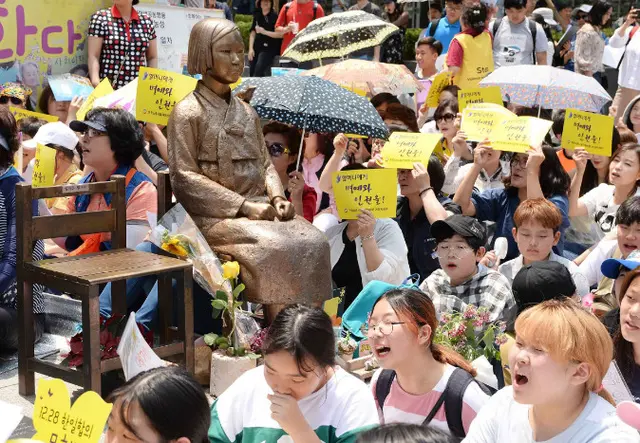South Korea said it will continue its efforts to expose the cruel history of Japan's wartime sexual enslavement of Korean women to the international community, following Japan's complaint of South Korea's plan to list documents about Korean victims as United Nations Educational, Scientific, and Cultural Organization's (UNESCO) documentary heritage.
"Our government's coherent stance is that we will continue efforts to make the "comfort women" issue a lesson from history and give the next generations the truth (about the issue)," Cho June-hyuck, spokesman for the Ministry of Foreign Affairs, said in a press briefing on Tuesday.
On Monday, Gender Equality and Family Minister Chung Hyun-back said she will support efforts to fund the listing of documents linked to "comfort women" on UNESCO's Memory of the World project.
Chung also unveiled a plan to establish a museum in Seoul to commemorate the "comfort women" victims.
The term "comfort women" is a euphemism for women who were forced into sex enslavement for Japanese military brothels before and during the Pacific War.
In response, the Japanese government lodged a protest with South Korea on Monday through diplomatic channels in Seoul, reported Japan's Kyodo News citing a foreign ministry source.
Japan's Foreign Minister Fumio Kishida on Tuesday expressed opposition to South Korea's move.
Seoul's intention is against "the original mission and purpose of the establishment of the UNESCO – fostering friendship and mutual understanding among member countries," Kishida told reporters.
"We have strongly conveyed our position to the South Korean government, in the wake of comments by gender equality and family minister Chung."
Kishida said the "comfort women" issue was "resolved finally and irreversibly" under the bilateral deal struck in 2015, adding that the government "will tenaciously call for steady implementation of the agreement at every occasion."
South Korea and Japan reached an agreement on "comfort women" on December 28, 2015, as Japan's Shinzo Abe cabinet promised then Park Geun-hye government about nine million US dollars to build a foundation in Seoul for the wartime sexual slavery victims.
However, South Korean victims demanded the repealing of the agreement and called for Abe's sincere apology and the legal responsibility for the wartime crimes against humanity.
(CGTN)
 简体中文
简体中文












